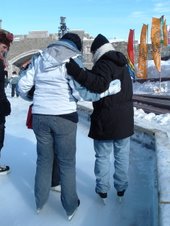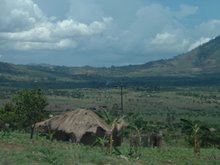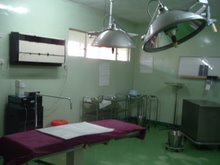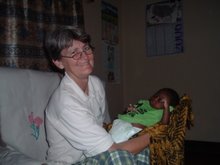******
An eventful month for me. Twins. Triplets. Breech deliveries. Cord prolapse. Uterine rupture. Ovarian cancer. Cervical cancer. Ectopic pregnancy. Tuberculous pleural effusion, tuberculous osteomyelitis, tuberculous cystic abscess, pulmonary tuberculosis. HIV positive, HIV negative. Kaposi sarcoma. Cerebral malaria, neonatal malaria, malaria with anemia, or just ordinary malungo. Kwashiorkor. Septic abortion.....
*******
Ectopic pregancy in Canada presents in a particular way: pain, positive pregnancy test, ultrasound showing no intrauterine pregnancy but not necessarily locating the ectopic, and not necessarily showing blood in the abdomen. But this is the fear: a ruptured tube and exsanguination (bleeding to death in the abdomen).
It is managed urgently or emergently depending on the level of pregnancy hormone and the presence of fluid in the abdomen. Either methotrexate to cause the pregnancy to abort and resolve, or if it is too late for that, surgery to remove the pregnancy and the source of bleeding.
In Malawi, women put up with incredible amounts of pain before coming to medical attention. And sometimes the results are surprising.
The doctor I have spent this month with tells a story of a lady who presented to Zomba Central Hospital because she was overdue. They confirmed her dates and tried to induce her labour, but nothing happened. They gave her repeated doses of drugs but her cervix stayed as tight as Fort Knox.
Eventually she left this hospital, because she felt she was not being helped, and presented to MMH. There, they performed an ultrasound and found that the baby was outside the uterus. The placenta had implanted on the outer wall of the uterus, and the amniotic sac was intact in the abdominal cavity. They performed a laparotomy to remove a live post-term female infant with apgars of 8 and 9.
Mother and baby did fine and went home after a week.
*****
Of course, this is unusual. I saw a lady who was sent to us by the prenatal clinic, known as sikelu or scale. She was sent for failing to gain weight normally. Her last menstrual period had been in April, but her uterus was 22 weeks, and felt, well, weird. There was a hard lump that felt subcutaneous in the epigastrium.
 The placenta was attached to the woman's right fallopian tube, and had destroyed the tube. It had developed into a large vascular ball instead of the flat leafy shape we are used to. The lady had, on history, had a lot of pain in May and througout the pregnancy, really, but had thought it normal and never complained.
The placenta was attached to the woman's right fallopian tube, and had destroyed the tube. It had developed into a large vascular ball instead of the flat leafy shape we are used to. The lady had, on history, had a lot of pain in May and througout the pregnancy, really, but had thought it normal and never complained.















